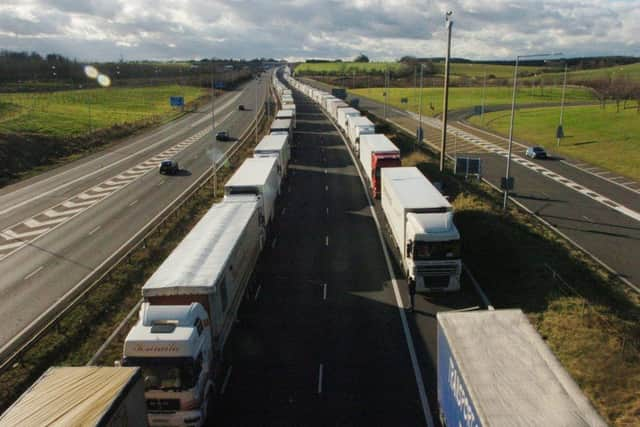Alarm bells over no-deal Brexit threat to Scottish exporters
They told The Scotsman the way in which the limited number of permits for hauliers would be allocated would discriminate against firms north of the Border.
Transport secretary Michael Matheson said permits would be awarded by the UK government on the basis of how many international trips hauliers had made over the past year.
Advertisement
Hide AdAdvertisement
Hide AdHe described the criteria as having the potential to “significantly disadvantage” Scottish firms. The freight industry said how much a firm relied on international business would also be taken into account.


Mr Matheson complained only 984 permits a year would be issued, which he described as “wholly insufficient to meet demand”.
In a letter to UK transport minister Jesse Norman, he wrote: “The number of journeys Scottish hauliers can undertake, compared to hauliers located closer to the Channel Tunnel or Dover, would likely be fewer due to the greater geographical distances involved.
“As a result, this could prevent Scottish hauliers from having equitable access to international permits, in a situation where these are limited in number.” The Road Haulage Association said the 984 permits, along with 240 monthly ones, was less than 6 per cent of existing licences used by UK firms.
Martin Reid, its Scotland policy director, said: “If we end up leaving Europe without a deal, and in the absence of any subsequent trade agreements, we become reliant on permits for freight movements across Europe. This will leave the industry in an incredibly precarious position as there are limited numbers of permits allowed to be issued by the UK.
“The cabinet secretary is correct to raise concerns about the application process as there is a strong likelihood that hauliers from Scotland who do not make as many journeys as those in south-east England will find themselves unsuccessful in their application for a permit.
“The UK government has effectively created a permit lottery and as with any lottery there are more losers than winners.” Mr Reid said goods particularly at risk were those with a short shelf life such as seafood and shellfish exports.
However, he said imported fruit and vegetables were also threatened. He said: “Delays mean losing the high-end market such as restaurants and having to sell to wholesalers at a reduced price or, in the worst case, having to dump the load if it is spoiled.”
Advertisement
Hide AdAdvertisement
Hide AdThe Freight Transport Association said the number of permits was “utterly insufficient” and “painfully short” of the number needed.
European policy manager Sarah Laouadi said: “Exports of time-sensitive products such as seafood, which Scotland exports in large quantities to France and Spain, are particularly reliant on efficient road haulage and roll-on/roll-off ferry connections.
“They would be heavily hit in a no-deal scenario with restrictions on road haulage.”
Ms Laouadi said there was no good way of allocating the European Conference of Ministers of Transport international road haulage permits because there were so few of them, there would always be losers.
However, she added: “Parliament must support the draft agreement to secure the transition period and give negotiators more time to devise a transport solution that would remove the need for permits.”
Meanwhile, Bank of England governor Mark Carney stepped up his warnings about the potential impact of a no-deal Brexit.
He told the Commons’ treasury committee increased tariff prices, import costs and a collapse in the value of the pound would send food prices soaring “quite quickly”.
In the most extreme no-deal scenario, shopping bills could rise by up to 10 per cent, but even in an orderly no-deal withdrawal, he said grocery prices could rise by 6 per cent.
Advertisement
Hide AdAdvertisement
Hide AdAt the Commons’ business committee, Toyota Europe deputy managing director Tony Walker warned without a deal to protect cross-continent supply chains, its operations in the UK would face major challenges.
In the latest sign of the government stepping up planning for a no-deal Brexit, firms that trade with the EU are being contacted to say they have to register for a UK economic operator registration and identification number or EORI. HM Revenue and Customs will be contacting 145,000 businesses who only import or export goods with the EU to advise them to register.
A Department for Transport spokesperson said: “In the unlikely event that we leave the EU with no deal, we will work with member states to agree or reinstate bilateral arrangements. If these arrangements require permits, we are confident this will not be a constraint on hauliers from any part of the UK.”